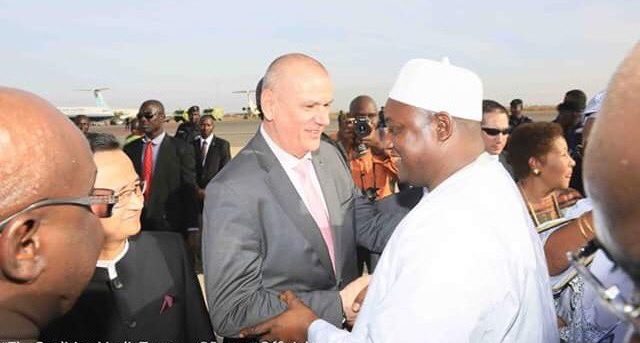By Tumbul Trawally, Seattle, USA
The interview of the Resident EU Ambassador to The Gambia, Attila Lagos, with the Chronicle Newspaper is very telling. The Ambassador mentioned a critical fact. The Gambian transition is different from other transitions, like the ones in Liberia, Sierra Leone, or Nigeria. In those instances, the transitional president was nominated. In The Gambia, the transitional president was elected. According to our Constitution, an elected president and parliament have a “MAXIMUM” mandate of 5 years. The president can call for elections, anytime, but he/she cannot extend his/her mandate beyond five years. Therefore, the Law is very clear on the issue! The Memorandum of Understanding (MOU) agreed to by the Coalition members becomes a “Moral” document—not a legally binding one. Morally, President Barrow should honor his words and stick to the three-year transition, but he is not legally obliged to do so. That decision to honor or dishonor the MOU is his—and his alone—to make.
After twenty-two years of a brutal dictatorship, the last thing Gambians need is civil disobedience and a potential for conflict. Every Gambian’s preoccupation should be the creation of jobs and the building of strong government institutions. Presidents come and go—Strong Civil Institutions endure and have an unlimited lifespan. The best way to prevent a future dictator (God Forbid), who has zero regard for Human Rights and the rule of law, is to have strong government institutions that would not buckle under pressure. It entails having an independent Legislature, Civil Service, Judiciary, Media, a professional military, which is answerable to the civilian authorities. The First Republican Constitution was not perfect; in fact, no Constitution is perfect. A Constitution is a Living/Breathing document, which needs amendments as time goes by, in order for it to maintain its relevancy, with the times.
Therefore, let the Constitutional Review Committee use the First Republican Constitution as their baseline and tweak the peripheries. That starts with the term limits of the presidency. Judges should be appointed for life, especially the Supreme Court Judges, for them to maintain their independence. One can liken a government to a football match. The opposing teams are akin to the legislative and the executive branches of government. The referee plays the role of a judge. In a healthy democracy, the verdicts of the courts trump the decisions of the legislative and executive branches of government, just like that of a referee on a football field.
In 2000, the US Supreme Court intervened and stopped the recount in Florida. Most Americans thought it was hastily done by the conservative majority on the Courts, to handover the presidency to George W Bush. Al Gore had no choice, but to accept their verdict. In weak democracies — with weak Institutions — that would have triggered a civil war. We are currently witnessing a daily assault on American Institutions, by President Trump. However, the Courts have handed him several defeats when the Attorneys General of the states sued his government.
Saul Badgie would not have been able to withdraw hundreds of thousands of dollars from the Central Bank if the Governors were nominated for a fixed term, whereby they would not have been beholden to the Dictator for job security. Likewise, the managers of Gamtel and Social Security would not have delivered bags of cash to the dictator, without the approval of the members of the Board of Directors, whose selection would have been outside of the powers of the president.
Apart from building strong government institutions at the national level, it is crucial to replicate them at the local levels. That brings me to the necessity for an increase in transparency and accountability in local governments. It starts with the election of governors, chiefs, Area Council Executives, by the voting population of their jurisdiction. The Area Councils have been, and are a cauldron of corruption. Their Executive Officers usually have more assets than the Permanent Secretary of the Ministry of Local Governments, who is their boss. The Audit department should exercise strong oversight over the finances of the Area Councils. To further enhance accountability, Alkalos of villages with a population of more than 2,000 should be elected, not nominated through traditional inheritance. Residents of small villages are usually closely related; therefore, they have similar interests. Not so much with large, diverse ones! The more power people have in electing their leaders, the more their leaders will respond to their demands. Elected officials always respond to the demands of their constituents, if they want to remain in power.
Strong government institutions would have prevented the likes of Momodou Sabally and Njogu Bah from becoming Secretary Generals. They were nowhere near the caliber of their predecessors: Ken Lane, Eric Christensen, Francis Mboge, Jabez Langley, or Sarrah Janha, educationally, morally, or experience wise. Because Momodou Sabally knew that he did not deserve the position, he ingratiated himself with the dictator, by insulting Mandinkas, who make up about 40 percent of the Gambian population. None of his predecessors would have stooped so low, in order to curry favors with a brutal dictator. We should not lose sight of the fact that (God Forbid) a potential dictator will have no trouble hiring the likes of Momodou Sabally, Edward Graham of Social Security, or Saul Badgie and his Junglers. There is no shortage in supply of them in The Gambia.

